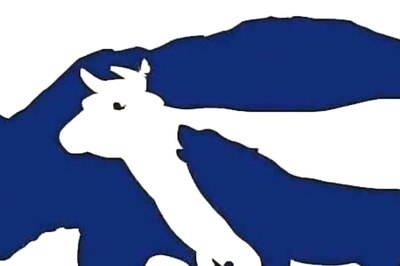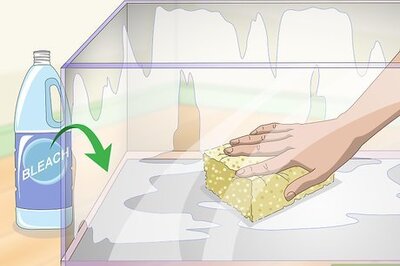
views
Buenos Aires: US President Donald Trump, ahead of a tariffs showdown with China, diverged with G20 partners at summit talks Saturday in refusing to back global action on climate change and by watering down past pledges to fight trade protectionism.
A final communique adopted after all-night haggling in the summit in Argentina said all other G20 members agreed to implement the "irreversible" Paris Agreement on climate change, while respecting different paces of economic development.
But it said the "United States reiterates its decision to withdraw from the Paris Agreement," mirroring the divergence seen last year when Trump shocked the global community by bucking the consensus at his first G20.
The statement also omitted pledges by the G20 to fight protectionism and uphold multilateral trading rules, which used to be a mainstay of the world's leading economies pre-Trump.
Instead, it merely recognized the "contribution" of the "multilateral trading system," and added that it was "falling short" in goals of growth and job creation.
Trump's determination to plow on with his "America First" agenda stands in contrast to the alliance-building presidency of George Bush, whose death Friday triggered a rare show of unity from G20 leaders.
Trump said his predecessor's passing would prevent him holding a post-summit news conference scheduled for later Saturday, "out of respect" for the Bush family.
It was Trump's second cancellation of the summit after he snubbed Russian President Vladimir Putin in Buenos Aires, citing Russia's recent naval skirmish with Ukraine, and he has also downgraded meetings with other G20 leaders to make them less formal.
The cancellation means Trump will no longer face press questions over new developments this week stemming from a US investigation into whether his presidential campaign colluded with Russia, which has now spread to cover his past business dealings.
Other hotspots such as Ukraine also flared up at the two-day summit, although Saudi Arabia's Crown Prince Mohammed bin Salman received an effusive welcome from Putin, showing the de facto ruler still has friends despite the killing of a dissident Saudi journalist.
Financial markets, while hoping for a ceasefire to Trump's trade war with China, were also watching Putin and the prince for any sign that the world's two top exporters of crude might cut output to shore up collapsing oil prices.
Putin meanwhile has been forced to defend Russia's seizure of three Ukrainian vessels off Crimea in meetings with counterparts such as German Chancellor Angela Merkel and French President Emmanuel Macron.
"The chancellor reiterated her concern about the escalation of the Kerch Strait and her commitment to the freedom of shipping into the Sea of Azov," Merkel's spokesman Steffen Seibert said after she met Putin on Saturday.
In Buenos Aires, Merkel also paid tribute to Bush as a "true friend" of the German people who helped bring about Germany's reunification after the Berlin Wall came down.
Macron, pausing from his attempts to build a G20 front on climate change and from the challenge of violent protests back home, said Bush "was a world leader, who strongly supported the alliance with Europe".
British Prime Minister Theresa May echoed Merkel in lauding the late Bush as "a great statesman and a true friend of our country." Trump himself said Bush had "inspired generations of his fellow Americans to public service."
But the current president's isolationist rampage is the polar opposite of the West's post-war consensus on trade and diplomacy built by Bush and his predecessors in the White House.
The G20 leaders — whose nations represent four-fifths of the global economy — heard warnings from the International Monetary Fund (IMF) of worldwide upheaval if Trump continues on his tariff-strewn path.
IMF chief Christine Lagarde warned the leaders that "the global economy faces a critical juncture" and that erecting trade barriers was "self-defeating". The threat of Britain crashing out of the European Union without a negotiated deal is another potential headwind, the IMF said, as May uses the G20 to sell her vision of a "global Britain" after Brexit.
The release of the G20 communique meant that the meeting at least avoided the fate of two other recent summits -- those of the Group of Seven democracies and the Asia-Pacific Economic Cooperation forum -- that ended without any collective statement owing to US objections.
But for financial markets, the weekend's main course comes after the summit when Trump is due to sit down to dinner with Chinese President Xi Jinping in Buenos Aires.
Trump, who has already slapped $250 billion in tariffs on China and threatened more to come next month, sounded upbeat about making progress with Xi.
"We're working very hard. If we could make a deal, that would be good," he said on Friday.
Trump has thrown out the traditional US playbook on free trade since his shock 2016 election, vowing to protect forgotten workers and demanding a renegotiation of the North American Free Trade Agreement with Canada and Mexico.
The three countries signed a new trade deal on Friday, on the G20 margins. The leader of communist China has in turn cast himself as a defender of stable global capitalism. But in a rhetorical olive branch to Trump, Xi pledged at the G20 to do more to open up China's economy.




















Comments
0 comment